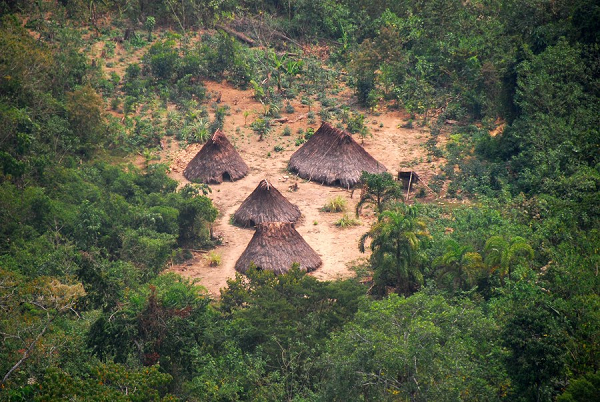
Law, Environment and Natural Resources (GIVE).
Although in September 2023 it was possible to archive the Bill No. 3518 which sought to modify Law No. 28736 (“PIACI Law” for the protection of Indigenous or Native Peoples in a Situation of Isolation and in a Situation of Initial Contact), the narratives and motivations behind this initiative still continue.
In recent months, Congress has declared a series of road connectivity initiatives in the Amazon of national interest, such as Bill 06960/2023-CR that promotes a highway to the border area between Ucayali and Brazil, and overlap or approach territories of the Indigenous Peoples in a situation of Isolation and a situation of Initial Contact (PIACI). Another example, in the southern Amazon, in the Cusco region, a highway is being promoted that, if built, would be 100 km from the Kugapakori Nahua Territorial Reserve, Nanti and others. In addition, the promotion of the new central highway, which together with the port of Chancay promotes the idea of connecting Brazil with Peru, as was already attempted with the South Interoceanic Highway and the port of Matarani.
This idea of “connect” the Amazon, imagining access to an infinite source of resources that continues to bring “development” to the cities, would do nothing more than “connect” illegal activities (for example, drug trafficking, illegal mining) and create greater fronts of deforestation with negative impacts such as invasions, deepening the situation of vulnerability and social gaps. Thus, a blind public investment, without planning with a comprehensive approach, would end up causing the opposite, disconnecting the State, making it absent because it does not fulfill its care responsibilities.
Faced with these threats, it is necessary to remember the commitments and pending tasks.
1) Creation of Indigenous Reserves: The Regional Organization of Indigenous Peoples of the East (ORPIO) recalled that the Ministry of Culture is pending the issuance of the Supreme Decree to conclude the creation of the Sierra del Divisor Occidental Indigenous Reserve and to approve the studies of the Yavarí Mirim Indigenous Reserve. It is urgent to conclude these processes to ensure the protection of the life and territory of the PIACI.
2) Control posts, trained personnel and access to information: With the recent rainy season in the Amazon, damage has been reported to the installation of State checkpoints in the PIACI reserves. According to a Convoca report, of the 17 checkpoints, only 6 are in optimal condition and the others need some repair or relocation. There are about 36 people who work in these positions, monitoring approximately 4 million hectares. This system must be strengthened and complemented by at least two elements, the first is a budget and personnel increase, and the second is the management of the information generated in the positions. Modernization in the systematization and access to information on alerts and PIACI status by reservation would help strengthen protection mechanisms.
3) Attention to the local population that lives on the border with the PIAC territoriesI: It is more than redundant to point out that the PIACI Law does not prevent development projects or basic services from reaching local populations. On the contrary, this is due to a historical weakness in public management and its authorities. In fact, the communities on the borders of the PIACI reserves are actors with information that can contribute with their active participation in protection. In this way, as part of its coordination with the State, help access basic services and care.
Now that the Atlantic-Pacific connection seems a geopolitical obsession and that its investment projects seek to cross the Amazon, let us not leave out the responsibility of the State in the protection of the PIACI and their territories.
Not only would it be a mistake, but its consequences would repeat stories of colonial ethnocide, in the name of a “new” development in the 21st century.
[CONTENIDO PATROCINADO]
Source: Larepublica
Alia is a professional author and journalist, working at 247 news agency. She writes on various topics from economy news to general interest pieces, providing readers with relevant and informative content. With years of experience, she brings a unique perspective and in-depth analysis to her work.












